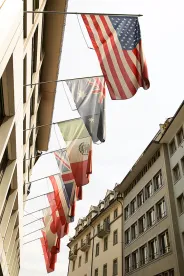January 16, 2016 marked the arrival of "Implementation Day" under the July 14, 2015 Joint Comprehensive Plan of Action (JCPOA) between the United States, Iran, European Union, and the "P5+1" countries.[1] Under this agreement, the United States has agreed to lift certain sanctions targeting Iran, including sanctions on the sale and export of commercial passenger aircraft, parts, components and associated services to Iran.
As of January 16, US persons and entities will be able to obtain licenses from the US Treasury Department's Office of Foreign Assets Control (OFAC) to sell or lease commercial passenger aircraft to certain Iranian airlines and nationals. Given the outdated and poor condition of much of Iran's current fleet of commercial aircraft, the lifting of these sanctions is expected to open a market in great need of investment dollars and may provide opportunities for US entities in the commercial aircraft industry. Those seeking to do business with Iran must be very careful to ensure that they meet strict conditions imposed by OFAC to receive the necessary authorizations to proceed.
Lifting Prohibitions on Commercial Passenger Aircraft Sales
The occurrence of Implementation Day was triggered by an International Atomic Energy Association report that Iran had performed its nuclear-related commitments under the JCPOA. The list of industries targeted for sanctions relief under the JCPOA is significant; however, most of the sanctions lifted under the JCPOA pertain to restrictions imposed on non-US persons. US persons and entities continue to be broadly prohibited from engaging in transactions, directly or indirectly, with Iran or its government.
One of the sanctions eased for US persons provides for the licensing of transactions with certain entities in Iran for commercial passenger aircraft and related parts and services.[2] In response to the announcement of Implementation Day, OFAC issued a Statement of Licensing Policy adopting a "favorable" policy toward licensing civil aircraft transactions.[3] Specifically, OFAC will allow the following kinds of transactions: (1) the export, re-export, sale, lease, or transfer to Iran of commercial passenger aircraft for exclusively civil aviation end-use; (2) the export, re-export, sale, lease, or transfer to Iran of spare parts and components for commercial passenger aircraft; and (3) the provision of associated services exclusively for commercial passenger aviation, including warranty, maintenance, and repair services and safety-related inspections.
Note this policy still requires permission from the US government before a transaction can proceed. Any US person who wants to engage in commercial aircraft sales with Iran must first apply for a license with OFAC, and provide all relevant details of the proposed transaction. Applicants would be expected to include in their applications all parties involved in the transaction; intended end-uses by the Iranian entity of the aircraft, part, or service; any related transactions associated with the aircraft transaction, such as the provision of warranty, maintenance, repair services, inspection, or training; and other information relevant to whether the license should be granted. OFAC will analyze each application and determine whether to grant licenses on a case-by-case basis. OFAC is not expected to grant exporters blanket licenses to engage in multiple transactions.
Licenses may be issued for the sales of US-origin commercial passenger aircraft and commercial passenger aircraft that contains 10 percent or more US-controlled content. The types of aircraft that may be approved under this policy include wide-body, narrow-body, regional and commuter aircraft used exclusively for commercial passenger aviation. Not included under this policy include cargo aircraft, state aircraft, unmanned aerial vehicles, military aircraft and aircraft used for general aviation or aerial work. This may raise questions, for example, where customers may be seeking to purchase aircraft specially outfitted for hybrid passenger and cargo operations. Such situations should be carefully analyzed, ideally with assistance from outside counsel or experts.
Other OFAC general licenses currently authorize transactions that are "ordinarily incident" to, and necessary for, a licensed transaction, including transactions providing for transportation, legal, insurance, shipping, delivery and financial payment services provided in connection with a licensed export. This means that, for example, a US person would be authorized to provide insurance to cover the export shipment of a licensed aircraft or part to an Iranian customer. This general license would not authorize, for example, a provision of continuing warranty services for an aircraft component for years after its exportation to Iran. Cases such as those would require a separate license application to OFAC.
It is critical for those seeking to do business with Iran's commercial aircraft industry to know their customer and the intended end-use for the merchandise or services provided. Parties also must continue to heed all restrictions on dealing with parties on the OFAC SDN List and other blocked party lists (e.g., Mahan Air in Iran continues to be a blocked party under the SDN List), as well as the Denied Persons and Entity Lists published by the Department of Commerce's Bureau of Industry and Security (BIS) and the List of Statutorily Debarred Parties published by the US State Department's Office of Defense Trade Controls. Similarly, parties must continue to address all licensing and other requirements under other export control laws and regulations, if the transaction involves goods or technology that would require a license from BIS.
Conclusion
It is important to remember that the relationship between Iran and the United States is continuously evolving. While Implementation Day marks a potential step toward an opening of Iran's market to the west, the very next day saw the imposition of new sanctions on individuals and entities involved in Iran's ballistic missile tests in December 2015. Given the volatility of US-Iranian relations, the extent to which new sanctions may be imposed or old sanctions phased out also is unpredictable.
In light of this unpredictability, the JCPOA carries an important carve-out: Should the United States determine that aircraft, goods, or services licensed to Iran under this new policy have been used for purposes other than exclusively for commercial passenger aviation, or have been re-sold or re-transferred to persons on the SDN List, it would have the right to cancel this licensing policy. Also, as continues to be the case, any US person who is found to be violating any sanctions administered by OFAC, or providing false information in order to obtain a license to engage with Iranian entities for commercial aircraft, will be subject to strict civil and criminal penalties. Thus, those looking to take advantage of new opportunities to sell or lease commercial aircraft, parts or components to Iran should proceed carefully, and ensure that their proposed transactions conform to OFAC's requirements in order to be licensed.
[1] The "P5+1" countries refers to the five UN Security Council countries—United States, China, France, United Kingdom and Russia—plus Germany.
[2] See JCPOA, Annex II, Section 5.1.1.
[3] See Statement of Licensing Policy For Activities Related to the Export or Re-export to Iran of Commercial Passenger Aircraft and Related Parts and Services, Office of Foreign Assets Control, January 16, 2016.






 />i
/>i
